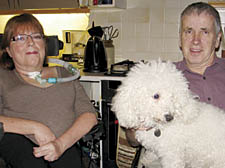|
|
 |
| |

Valerie Garnham with her husband and their Bichon Frise, Theo |
Disabled woman demands right to pick her own carers
Court challenge to ruling that agency staff must look after wheelchair user
A DISABLED woman from Holloway is at the centre of a landmark legal challenge that would allow her to hire her own carers, paid through the NHS.
Valerie Garnham, a lifelong wheelchair-user who lives in Hungerford Road, wants a return to a system that allowed her to take on her own private support staff, paying for them with money provided first by the council and later by the NHS.
The 60-year-old, who has a genetic muscular condition, has employed six support staff, including one who has looked after her for 21 years, but has been told that under the 2006 National Health Service Act funding for the workers is no longer available and care must be provided by NHS staff.
She believes this amounts to “discrimination” and is a violation of her basic human rights to control her own health. A legal ruling is expected in March.
Ms Garnham said: “I do not want my staff provided by an agency because we wouldn’t have any choice over who they are. It is much better for me to be able to advertise for the kind of people I want looking after me.
“I have been employing one carer for 21 years. We are like a big family here. You would never get that kind of continuity with agency workers because they come and go.”
If Ms Garnham wins her case, the Department of Health legal team argues, thousands of disabled patients will follow her in demanding cash to pay for private care. She is being represented in the High Court by the country’s leading disability rights lawyer, Paul Bowen QC, of Doughty Street Chambers.
Ms Garnham needs help with every aspect of daily life, and support workers often have to spend the night at her specially converted home. Her husband, Barry, 60, is also disabled.
The couple, despite both being in wheelchairs, lead independent lives and regularly attend Arsenal matches, the opera and ballet in the West End. “All of this has been made possible through the flexibility that direct payments have given in terms of being in control of the way that the care is delivered,” Mr Bowen said.
Ms Garnham was the first disabled person in Islington to receive direct payments when they were introduced by the council in 1996.
But in 2002, her condition worsened and her funding burden was shifted to Islington Primary Care Trust. Her direct payments continued, but in 2006 the law changed and she was told the funding was being withdrawn and her carers would be provided by the NHS.
NHS Islington insists Ms Garnham’s care will not be reduced if she is no longer allowed to manage it.
An NHS Islington spokeswoman said: “Legally, the NHS is currently not allowed to give direct payments to patients whose care is funded wholly through the NHS so that they can organise and pay for their own care directly. Legislation is currently going through Parliament to introduce this.”
She added that NHS Islington supported a change in the law that would allow people to feel more in control of their condition and the care they receive.
“Unfortunately, until the legislation changes we cannot do this,” the spokesman said.
“We do, however, work closely with all local people receiving continuing care to make sure we deliver high-quality care which is tailored to their needs and wishes.” |
 |
|
 |
|
| |
| |
|
 |
|